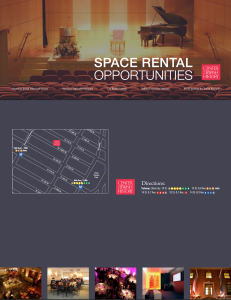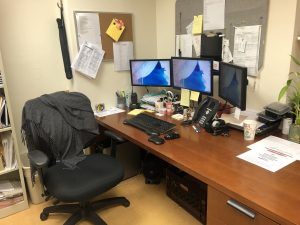My mentor was the Director of Operations but during this Internship it has been the Art Director. She has years of experience and is an interesting person to work with. She is always up for suggestions and puts things into considerations. She works well with others and provides great feedback to all the people she works with. Her personality is encouraging and she is always patient to the work that is done. She is definitely a great teacher, she taught me a lot about InDesign since it wasn’t my strongest program I’ve used. It was comfortable to work with her and easy to talk to. She didn’t make you feel like someone she was just working with, instead she made you feel like a friend.
Day: November 26, 2018
SELF EVALUATION
I already work for the Center but working with the design team to complete my internship was an interesting experience. My performance as a designer is different then an operations personnel. As a designer, I ask questions and listen to what needs to be done. I even look through different brochures and flyers to compare and refer back to. I do a lot of sketching when it comes to layout and my supervisor really liked the idea because it gave her a visual view of what to expect. Most of the designers on the team do not draw and that was one of my benefits to the team. I feel that I was able to time manage the project and not rush it, with the changes, it made the brochure more interesting and have a certain flow.
THE PROJECT
The main project was is redesign of a rental brochure and website page for the Center. I have learned that designing takes time and understanding how things move around a website and on paper, but I also realized that all templates can change and designs can go a different direction. I have also learned that design can change at any point, which this one did. I was told that the brochure would be a triple-fold but then I was told it would be just a flyer. I’ve also learned that not all matter gets saved when management changes and technology upgrades. Because there weren’t backup files to the old brochure, my supervisors suggested using a standard template and begin laying things into place, she was there through most of my process because I had a lot of questions. But once everything came together, it started looking nice and clean. As for the website, we need the website layout and there wasn’t an actually template, we used the brochure and made a lot of rearrangements which are still in the works. I personally do not like the red color and I had mentioned it to my supervisor last week—the great part about our own opinions—she mentioned she would look into it and we will discuss it. The greatest experience for me through this project, my opinions matter to my supervisor and are sometimes with into consideration and into play. Working with a team of designers is great because we all bounce our ideas off each other. The project is almost complete, we just need to make certain changes and tweaks to the website.
WHAT I’VE LEARN
Organizing Files
Within the programs that I have been using, I’ve learned how to save files and documents certain way, starting with the date. Most of the files that were previous saved, I needed to rename and all the new files were saved correctly by date. My supervisor mentioned that files are always easier to locate when by date followed by the name.
Designing a flyer
I have learned that most of the fliers designed were previously designed within InDesign. For me it was a challenge because I was used to designing within Illustrator. My supervisor mentioned to me that InDesign is a great program to use when designing fliers and it is a preferred program, therefore, I began creating. Within the process I’ve come to learn that InDesign was way better when setting up a triple-fold brochure with a simple design.
Designing a Template for a Website
I’ve learned how to break out of my comfort zone with designing a website template. It’s a back and forth with the webmaster. Working with a template is something I’ve learned in most of my classes. When working from scratch and not knowing exactly what a client wants is much difficult but when having a visual file and understanding how things work together was much more understandable.
Communicating with Architects
I’ve learned that communicating with Architects is totally different then speaking with rental clients. The conversations were regarding the installments for fire rated emergency doors. The benefit of speaking with Architects is a plus because the language is slightly different were measurements and blueprints were involved. Understanding that the Architects are people that do not waste time, but get straight to business, unlike rental clients who have more than enough time to walk around the space and ask questions.
THE CULTURE AT THE CENTER
The environment at the Center is professional and helpful. Every morning coming into work is an enjoyment. When first walking into the facility, two security guards greet you and then direct you to the front desk. There are two receptionists who sit there, they are the face of the company and they are always there to provide information or help a visitor with whatever they need. Employees are also helpful and when you don’t know something, or just looking for directions, everyone there helps.
Furthermore, my attire is business casual and yet there are days it’s business without the casual. Because I meet with rental clients, contractors, and vendors for my permanent position, I always need to look the part. Working with the Creative team, it’s more business casual. Therefore, when I know I don’t have meetings; I am dressed a bit more casual.
Since the Center is non-profit, every employee is entitled to an hour lunch. I personal enjoy eating and working all at the same time, I feel like I get more done.
Lastly, the office space is clean and organized, and the setup on the floor I work are offices around with open work space and drywall cubicles. I have an office because I handle a lot of confidential information/ documents. My supervisors office is just two doors from me, while the Creative team is located in the Concourse Level (basement), I am still able to work in my own space.
The Creative team office space has a lot of design material and digital equipment. There are four offices where the creative team is located and each space is really big, this is why four people in each room sit. When meeting with the team, I either meet everyone downstairs or the team (usually two – three people) comes upstairs to me.
MY ROLE AT THE CENTER
I started my internship at the Center for Jewish History in early September after speaking to my current supervisor, the Director of Operations. I currently hold a full-time position at the Center as an Operations Associate therefore, completing my internship at the Center made more sense then having to quit my job and look into another site.
After a meeting with my supervisor and the Creative Director, I was given the opportunity to complete my internship at the Center. For the next few months I am part of the Creative Management Team while working in Building Operations at the same time.
Because the Center hasn’t updated the rental page or the rental brochure, the Creative Director has given me the responsibly of redesigning the material while working closely with her.
WELCOME TO THE CENTER FOR JEWISH HISTORY
The Center for Jewish History, also known a CJH is a non-profit organization providing a collaboration home for five partner organizations: American Jewish Historical Society, American Sephardi Federation, Leo Baeck Institute, Yeshiva University Museum, and YIVO Institute for Jewish Research.
CJH partners’ archives holds the world’s largest and most comprehensive archives of modern Jewish experience outside of Israel. “The collections span a thousand years, with more than 5 miles of archival documents (in dozens of languages and alphabet systems), more than 500,000 volumes, as well as thousands of artworks, textiles, ritual objects, recordings, films, and photographs”.
CJH isn’t just the world’s foremost research institutions but the Center also offers fellowships, a wide array of exhibitions, symposiums, conferences and lectures. CJH is also a Smithsonian Affiliate, and is a partner of the Google Cultural Institute.
Lastly, CJH is the home to the Lillian Goldman Reading Room, Ackman & Ziff Family Genealogy Institute, the David Berg Rare Book Room, and the Collection Management & Conservation Wing.
The office is located in the heart of Chelsea, on W 16th Street between 5th and 6th Avenue. The building once was owned by Helen Keller, School for the Blind but was brought by the Center in 1999. My office is located between the 2nd and 3rd floor (2M to be exact). To the public the building is a three stories but to staff, the building is actually twelve floors. The building is of course very secure with security guards, a metal detector which staff and visitors must enter through. All staff contain a badge which allows certain access doors and locations, this means not everyone has access to certain locations.
Pictures below starting from left to right: Outside of the Building | Inside of the building main hall: Steinberg Great Hall (Dinners, Simulcast, etc. are held)







